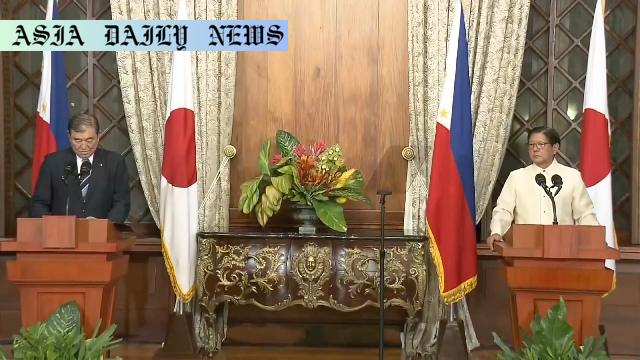Security Cooperation: Japan and the Philippines aim to enhance security collaboration through agreements on supplies and sensitive information exchange.
Japan and the Philippines agree to strengthen security cooperation.
Talks on Acquisition and Cross-Servicing Agreement (ACSA) initiated.
Leaders oppose unilateral changes in the East, South China seas.
Discussion on US tariffs, free trade system, and economic impact.
Japan commits to aiding infrastructure and disaster prevention.

Japan and the Philippines Strengthen Security Cooperation
In a recent meeting held in Manila, the Japanese Prime Minister Ishiba Shigeru and Philippine President Ferdinand Marcos Jr. announced their mutual agreement to strengthen bilateral security cooperation. Emphasizing the importance of their shared regional ties, the leaders focused on building a solid framework for collaboration, particularly in light of maritime tensions and shared defense strategies.
During their 90-minute discussion, both parties agreed to enhance ties through the initiation of comprehensive agreements, primarily focusing on the Acquisition and Cross-Servicing Agreement (ACSA), which ensures streamlined supply and service exchanges between Japan’s Self-Defense Forces and the Philippine military. The leaders also introduced plans to bolster information security through an information protection agreement aimed at safeguarding sensitive data shared between the nations.
Addressing Regional Challenges and Shared Values
Highlighting their alliance under the United States’ umbrella, Ishiba stressed that Japan and the Philippines share foundational principles such as the rule of law. Both nations are united by their commitment to countering unilateral moves to alter the status quo in the East and South China seas, an area of rising assertiveness from China. This agreement underlines their resolve to promote peace and stability within the region.
With a focus on maintaining a rules-based order, the two nations explored strategies for effective bilateral cooperation, especially focusing on challenges concerning national security, disaster management, and economic resilience. This emphasizes their united front in tackling shared adversities and establishing a fortified bond in the long term.
Economic and Infrastructural Collaboration
The discussions did not solely revolve around military affairs. Economic matters, including the potential impacts of the US’s new tariff policies on the global economy, were also deliberated upon. Japan demonstrated a strong willingness to cooperate in various fields vital for Philippine growth. These areas include communication technology, energy, and infrastructure development, as well as disaster prevention efforts.
Moreover, Japanese businesses established in the Philippines remain a significant focus for interest and collaboration. Prime Minister Ishiba noted that their economic partnership should address the concerns of both governments, ensuring mutually beneficial outcomes and sustainable growth.
Humanitarian Commitments
In an emotionally resonant gesture, Prime Minister Ishiba met with descendants of Japanese heritage, some of whom were left stateless after World War II. Ishiba expressed deep regret over the challenges they continue to face in gaining Japanese citizenship, underscoring Japan’s commitment to remedying this situation. The Japanese government vowed to expedite processes to restore citizenship and enable temporary return for these individuals and their families.
The interaction reflected Japan’s acknowledgment of its historical obligations and its desire to extend compassion toward its diaspora. Such commitments reinforce the idea that bilateral cooperation expands beyond geopolitics, emphasizing humanistic dimensions of international relations.
Conclusion: A Strengthened Partnership
The strengthened cooperation between Japan and the Philippines signifies a progressive step toward regional and international stability. By focusing on both security and economic development, these two nations underscore their intent to build a robust and comprehensive partnership. Their united stance against external assertiveness and shared investment in growth portrays a promising future for the relationship.
As Asia witnesses evolving geopolitical landscapes, the partnership between Japan and the Philippines may soon set benchmarks for regional cooperation and joint prosperity. This agreement demonstrates their unified vision of navigating challenges while adhering to shared values.
Commentary
Strengthening Bonds Amid Increasing Geopolitical Tensions
The recent agreement between Japan and the Philippines is a significant and timely move, especially in the wake of a rapidly evolving geopolitical environment in the Asia-Pacific. Both nations understand the critical value of aligning their efforts in light of increasing challenges, particularly those posed by China’s assertiveness in the East and South China seas. This alignment not only strengthens their ability to respond to security challenges but also signals their commitment to upholding a rules-based international order.
Economic Growth Complementing Security Collaboration
Beyond security, it is also commendable how both countries are working together to bolster economic ties. Japan’s willingness to bring its expertise into areas such as infrastructure, communication, and disaster management will undoubtedly have long-term benefits for the Philippines. This cooperative approach underscores the multi-dimensional nature of their partnership. Such holistic cooperation demonstrates how alliances can go beyond military agreements to drive meaningful socio-economic development.
Humanitarian Focus Adds Depth to Bilateral Relations
Prime Minister Ishiba’s focus on addressing the plight of individuals of Japanese descent sheds light on Japan’s commitment to not only fostering formal partnerships but also addressing humanitarian concerns. These gestures are emblematic of a mature partnership that understands the value of acknowledging history while shaping a shared future. Such actions show a humanistic aspect to diplomacy that resonates deeply on a global scale.
Overall, the reinforced cooperation between Japan and the Philippines sets an inspiring blueprint for how nations in the Asia-Pacific region can come together in the face of shared adversities. Their united efforts reflect a larger vision for stability, growth, and mutual respect amid turbulent times.


